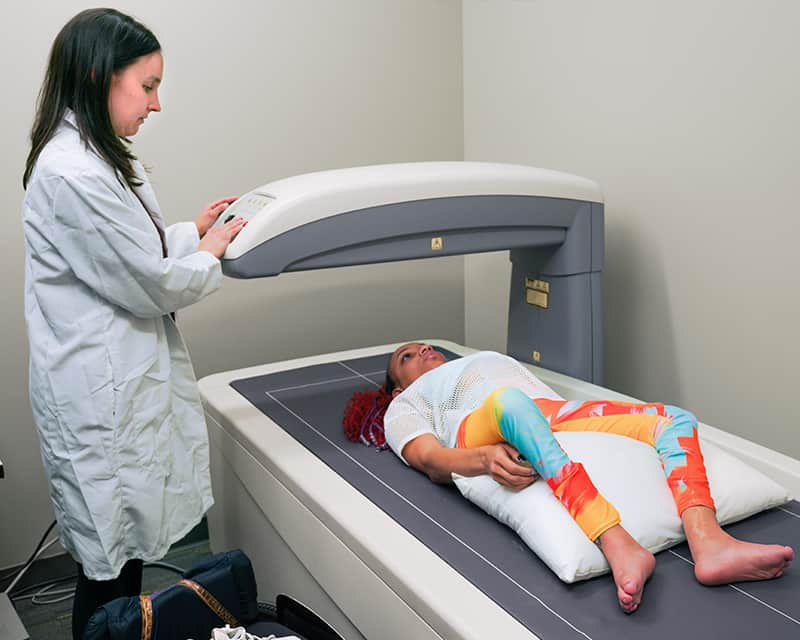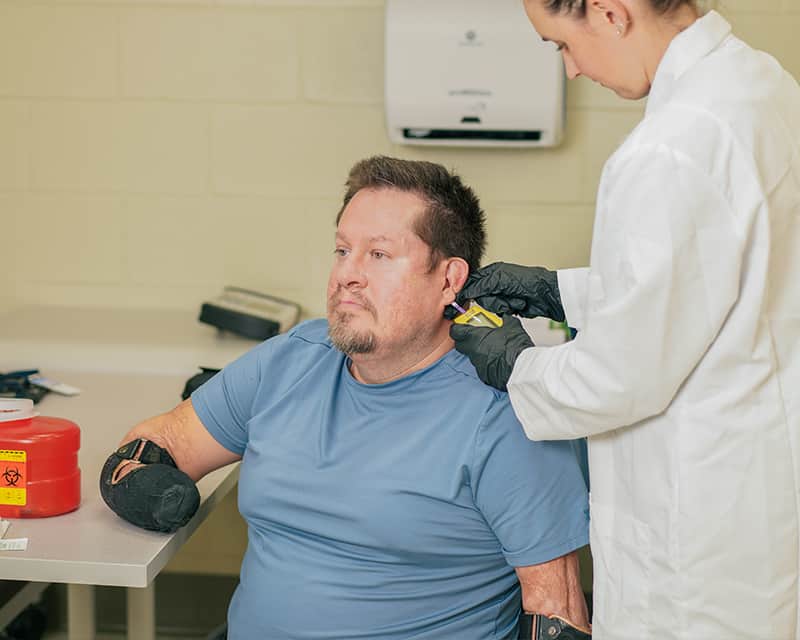 The Adaptive Human Performance Lab (AHPL) was designed to provide innovative and extensive services for exercise, nutrition, physical activity, and health assessments and interventions for research related to improving physical and psychological well-being of people with disabilities. The AHPL is a 3,000 square foot facility well-equipped to provide accessible, inclusive, and adapted equipment, techniques, and resources across the UAB campus.
The Adaptive Human Performance Lab (AHPL) was designed to provide innovative and extensive services for exercise, nutrition, physical activity, and health assessments and interventions for research related to improving physical and psychological well-being of people with disabilities. The AHPL is a 3,000 square foot facility well-equipped to provide accessible, inclusive, and adapted equipment, techniques, and resources across the UAB campus.
To effectively implement these interventions and technologies, the AHPL offers expert training, consultations, and instruction on adaptations to current and future programs and protocols using evidence-based practices in order to best incorporate people with disabilities into all areas of health and wellness research activities.
Consultation and Training
The AHPL core offers consultation services and trainings for researchers interested in designing studies, protocols, and programs in human performance and nutrition that focus on the inclusion of people with disabilities, from concept development through publication. The director, Dr. Jim Rimmer, and his team can assist investigators in the development of tools/testing methods to optimize methodological development specific to the needs of your study. We are open to all UAB investigators as well as other investigators in the research community. Please contact us for more information and pricing.
Services and Equipment
-
Body Composition Analysis
DXA (Dual Energy X-Ray Absorptiometry) (GE Healthcare Prodigy) is a tool that uses a three-compartment model to measure body composition and quantify fat mass, lean mass, and bone mass of an individual. The DXA measures total body and segmental regions of interest such as arms, legs, android, and gynoid areas. With repeated measurements, body composition trends and changes over time can be measured and monitored to best assess the impact of protocols and programs.
InBody H20N is a smart scale that also employs BIA technology to measure body weight, percent body fat, and muscle mass in less than 30 seconds.
-
Arm Crank Ergometry – Maximal and Submaximal
The arm crank ergometer (LODE Angio CPET) is a height-adjustable, stand-mounted arm crank that can be used for submaximal or maximal and graded or steady state cardiovascular exercise testing. The arm crank operates independent of pedal speed and has a range of 7-1,000 watts (W) with load increments as small as 1 W, allowing for complete customization of protocols. The arm pedals can be exchanged for leg pedals for cycle ergometry testing.
-
Gait Analysis (GAITRite) – With and Without Assistive Devices
The GAITRite is a 20-foot, pressure-sensitive walkway that objectively measures temporal and spatial gait parameters. The GAITRite is portable and can be laid over any smooth, flat surface to record multiple gait cycles in a single walk, if desired. Gait patterns can be analyzed while walking without an assistive device or with the aid of various types of canes, crutches, and walkers.
-
Maximal and Submaximal Oxygen Consumption
ParvoMedics TrueOne 2400 is a metabolic measurement system for cardiovascular submaximal and maximal exercise testing. This system is used for lab-based, stationary-movement exercise testing such as arm or leg ergometry. Measurements include oxygen consumption (VO2), cardon dioxide production (CO2), minute ventilation (VE), metabolic equivalents (METS), respiratory exchange ratio (RER), and others. ParvoMedics TrueOne 2400
ParvoMedics TrueOne 2400COSMED K5 is a portable, wearable metabolic measurement system for cardiovascular submaximal and maximal exercise testing and general physical activity testing. This system is used for both lab-based and field-based exercise and physical activity measurements and both indoor and outdoor use.
 COSMED K5
COSMED K5 -
Fitness Testing and Supervised Exercise Training
The AHPL has the ability to facilitate, lead, and monitor general fitness and exercise testing for people of all ages with and without a disability. The fitness testing offerings range from novel protocols to standard testing batteries, depending on the needs of the research study or community program.
The AHPL also offers exercise or physical activity in-person or remote training for participants with disabilities supervised by staff members. Lab staff are experienced in administering exercise or physical activity programs and interventions for participants with a variety of disabilities and mobility limitations.
-
Phlebotomy Services
 Phlebotomy services are available for research studies that require blood samples taken for screening, diagnosing, or monitoring health conditions. This allows for convenient collection right in the lab with trained and experienced phlebotomists.
Phlebotomy services are available for research studies that require blood samples taken for screening, diagnosing, or monitoring health conditions. This allows for convenient collection right in the lab with trained and experienced phlebotomists.
Pricing
-
Space
Service Price Lab Space (Room 120) $35/hour Private Treatment Rooms (Rooms 110, 112, 113) $5/hour -
Intake
Service Price Administration of consent/questionnaires $15 per 30 minutes, $30 per hour -
Equipment*
* Use of all equipment requires training by lab staff.
Service Price DXA $75 per use Lode Angio $80 per use GaitRite $75 per use Parvo Metabolic Cart $80 per use COSMED Portable Metabolic System $80 per use Spirometer $20 per use -
Exercise Physiologist
Service Price Supervised Exercise Intervention $35 per hour Physical Performance Testing (gait, balance, strength, endurance testing) $50 per hour -
Phlebotomy
Service Price Using AHPL's vacutainers $12 per draw Bringing vacutainers $8 per draw